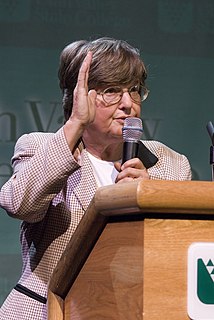A Quote by Tom Butler-Bowdon
Edward Banfield's idea of the "long time horizon," says that more successful people look further into the future, judging their efforts and results in terms of decades, not weeks or even months. This is the power of thinking long.
Related Quotes
I think markets are often not thinking on a long-time horizon, I think that our government structurally is doing even less so. When we have a government where we have people who are up for election at most once every six years for a U.S. senator, that's a time horizon that is much shorter than in a market that a company is looking at 10, 15, 20 years which is a time horizon over which a stock price is typically valued.
What is the manager's job? It is to direct the resources and the efforts of the business toward opportunities for economically significant results. This sounds trite - and it is. But every analysis of actual allocation of resources and efforts in business that I have ever seen or made showed clearly that the bulk of time, work, attention, and money first goes to problems rather than to opportunities, and, secondly, to areas where even extraordinarily successful performance will have minimal impact on results.
I’m a big fan of history—applying the lessons as well as the joys and sadness. If we pay attention, we would see how we affect each other. In terms of time, we are not that far from one another. If we were to look back a century, it would seem like a long time; but, if we look at it by decades then it’s only 10 years, and by generations it’s only five.
I got a part opposite Edward G. Robinson in a play called Middle of The Night, which Paddy Cheyafsky had written. It played for a long time because everybody just loved Edward G. Robinson, everybody in New York wanted to see it. John and I were married at the time and put into a position where I was working very long evening hours and he was working in the daytime and so there was a lot of spare time.
Every time I have people over, I watch how long they look at every part of the painting, or pictures on my computer. I have a few close friends and people that are constants. Whether I like their opinion or not, I've been hearing it for a long time and I can use it as this constant. I mentally pay attention to how long they look at every image, which ones they pause on and what parts of it they look at.



































